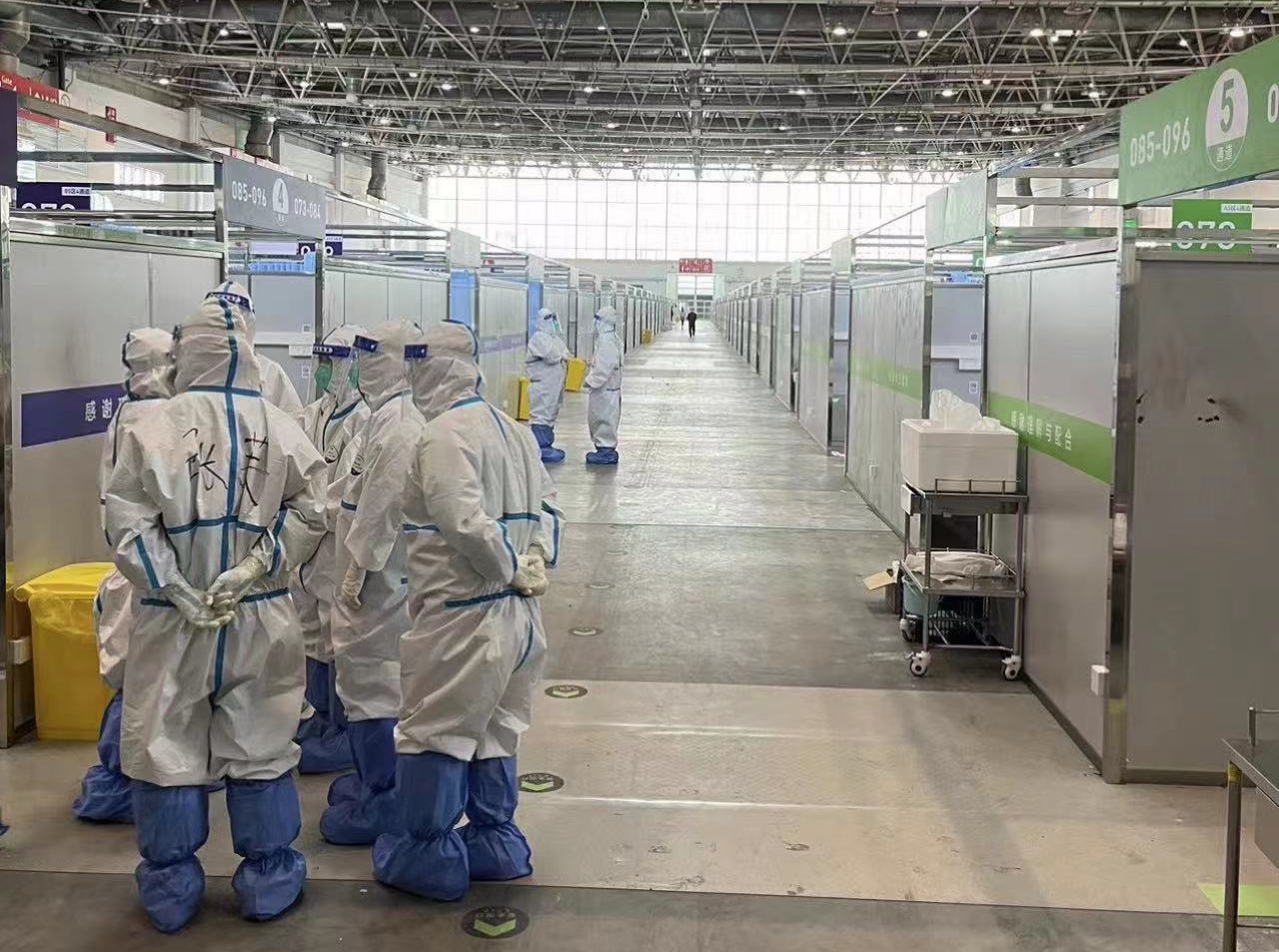Beijing is on edge. A surge in COVID-19 cases earlier this month led to lockdown fears as China prepares to enter year three of its strict “zero-COVID” policy. Heavy restrictions led to a rare wave of protests across the country, where public dissent is usually quashed and internet speech is often censored. Demonstrations have rippled past the country’s borders — even landing in Pittsburgh Friday night.
Friday’s vigil on Carnegie Mellon University’s campus honored the lives of people who died in a fire while unable to leave their building in Urumqi, a city in western China’s Xinjiang autonomous region. Ahead of the vigil, I wanted to dig deeper into the situation in Beijing, where changing, but still ongoing, “zero-COVID” rules are affecting millions of people. I previously worked as a journalist and editor in Beijing.
Speaking on condition of anonymity, a British resident of Beijing spoke to the Union Progress from inside a Beijing convention center that’s been converted to a quarantine facility for 1,000-plus COVID-positive people. At the time of our call, he was still unsure when he would be released. What he described is a system struggling to keep up with the rise in cases, facilities unprepared for the amount of patients they would need to house, and frustrated Beijingers willing to shout to have their voices heard.
This interview has been edited for length and clarity.
How long have you been in the quarantine center?
I’ve now been here a week.
Tell me about the condition of the facilities.
In the section I arrived in, the beds and stuff were all set up. But in terms of management, it had clearly just opened because they hadn’t really organized anything. It’s been changing every day, but when I arrived they didn’t have any kind of system for garbage. So people would eat and just put their garbage in the corner. The bathrooms clearly hadn’t been cleaned at all. The entire ground was wet, and you had to search toilet by toilet to find one because they were all like covered in … you know, various types of human waste, like really like the worst [toilet] I’ve ever seen. And there were no bins or anything so there was dirty toilet paper covering all the ground. I came in Wednesday, and I met someone who came on Monday, and he said it had been like that since he arrived. They just hadn’t had the time or the system to work out what they’re meant to do with the bathroom, it being a thousand people living there.
What’s the mood been like in there?
The first few days, the main frustrations were the conditions. It wasn’t until day four that they really started giving us supplies. Day one, there was no toilet paper. And day two they had rationed toilet paper. My third day, [things] really kicked off because they hadn’t given us any tests yet. [Patients must test negative to leave the center.]
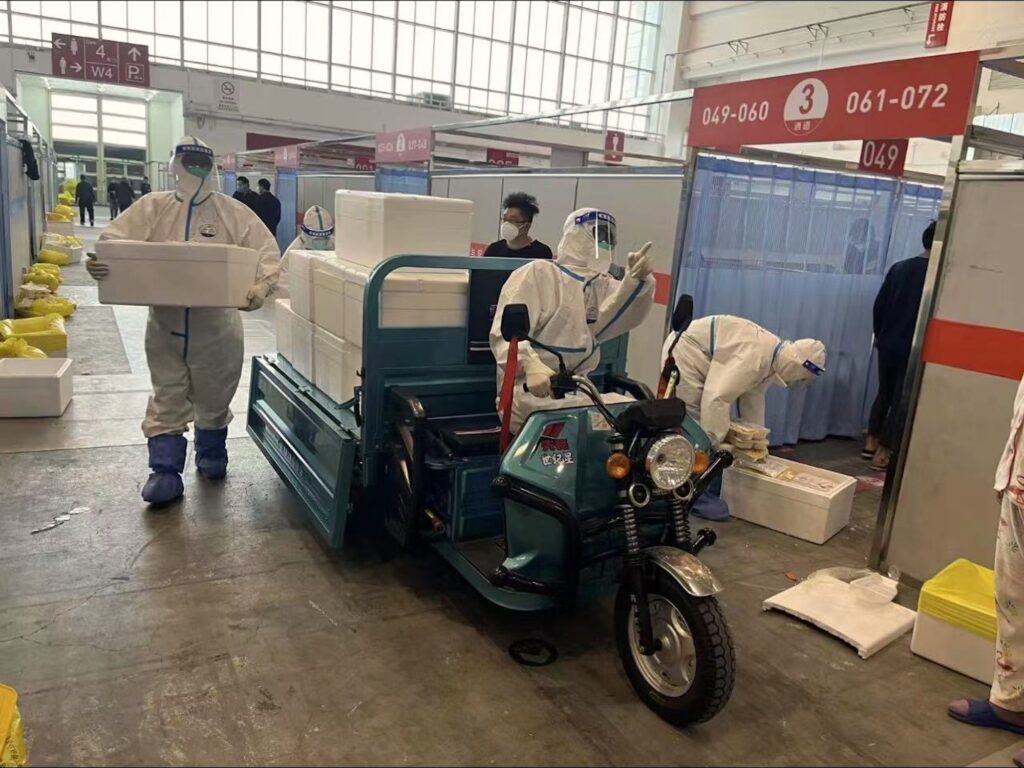
Some people knew that they were already basically better. So a bunch of people gathered at the entrance and were shouting for tests and not getting any answers. They started shouting, “One, two, three, do the nucleic acid test!” and getting people to film. They were like, “Send it out so people know.” And then a couple more brave or proactive people were fully screaming, being like, “This is awful. This is the capital of China and the conditions are like this. There’s no toilet paper.” Someone was even like, “I hope you die of late stage cancer!” Most people were just standing around filming. It was a smaller number who were actually shouting and complaining, but I think the sentiment was shared by everyone.
Since then, they’ve started testing us every day, and they gave us a supply pack. And everything’s clean, and we’ve got hot showers. I think they did enough to kind of calm the group.
How do you spend your time? What do you do in there?
Not a lot. Breakfast, lunch and dinner are pretty scheduled. We get breakfast at like, seven, lunch like midday, and then dinner is seven or eight. Also from day five on, I started getting tested every morning. They come around around 6 or 7 a.m., though today it was 5:50 am., so that was fun.
Most people just seem to be lying in bed on their phones. Not many people are doing much. The internet isn’t great. I’m trying to work, but the connection is really, really slow even if I try and use my Wi-Fi hot spot because there’s so many people doing the same.
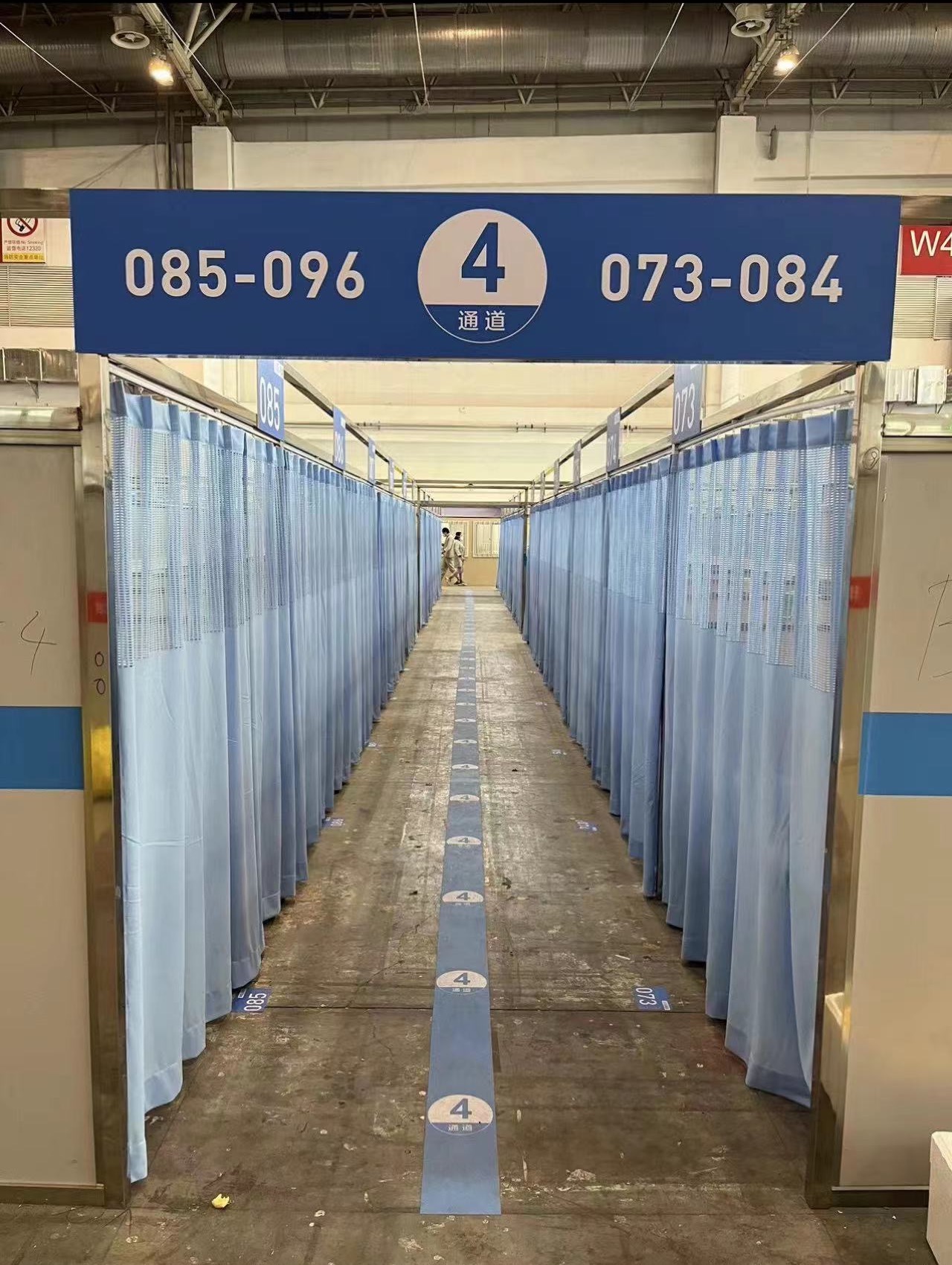
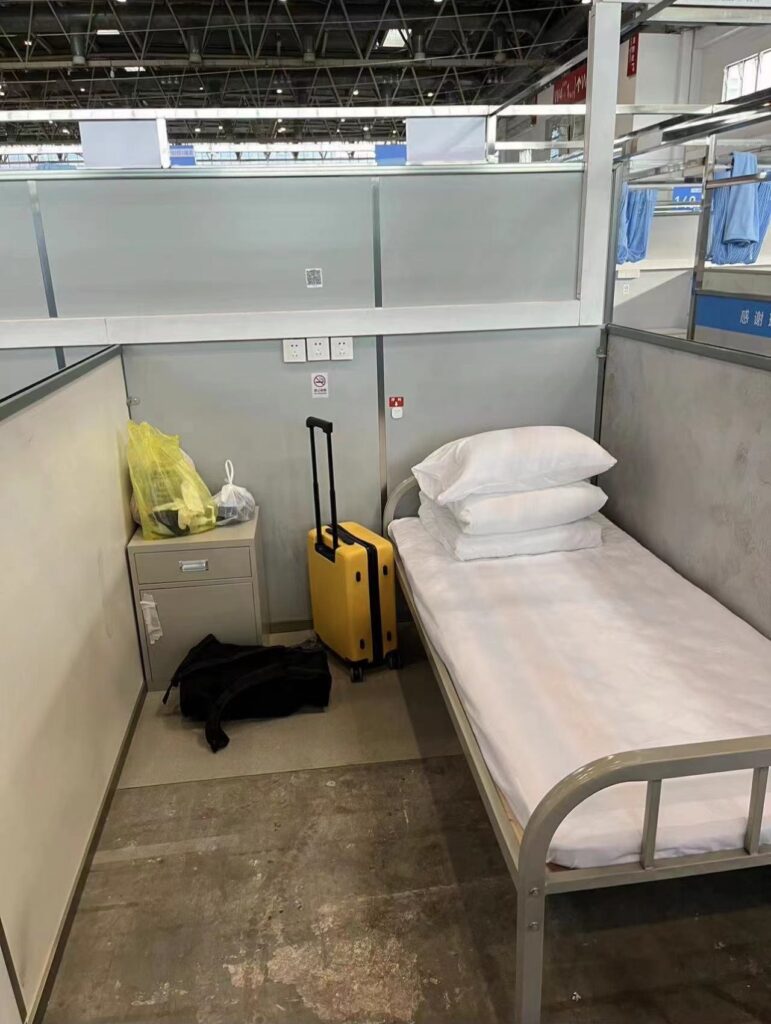
” … Most people, myself included, are lying in bed on their phones and computers waiting for the day to go by.”
There are some small groups of people in the corner putting on music and doing dances together, playing games, but not loads. Then there’s a smoking corner where the old men smoke and gossip together. But most people, myself included, are lying in bed on their phones and computers waiting for the day to go by. Sometimes I walk around the halls to get some exercise. By exercise I mean like, literally walking the circle around like the exhibition center. We can’t go outside. We can’t leave our part of the hall either.
How did you end up there?
My housemate found out that a bunch of his co-workers had gotten COVID, and then he started feeling sick last Saturday. We called the community [committee, which oversees tracking for the neighborhood], and they were just like, “Oh, just stay at home. If you haven’t had a positive test or anything, don’t worry about it.” I was waiting for a test result to come through. So I stayed at home Sunday and then Monday as well, and Monday like 8 or 9 p.m. I got a call.
The way they do testing here is they test a bunch of people in batches. So they called me, and they’re like, “Your batch came up with a positive so we need to come to your house and test you individually.” So the Da Bais [editor’s note: Literally meaning “big whites,” Da Bai is the Chinese slang term for those working to enforce the “zero-COVID” policy because of their all-white hazmat suits] came over, and they did three rapid tests. All three of them came up positive, which wasn’t surprising. And then they did a PCR because they’re like, “We have to wait for the results to come through from this, too.” Initially, they were like, “You’re gonna have to leave tonight. Pack your bags.” So I packed and waited, and then they said that the guy who was driving was asleep, so I’d have to wait.
I ended up waiting a full whole other night. It wasn’t till Tuesday that I got the confirmation that I did have to go to the quarantine center. They didn’t know where I was going, and they said they thought it would be the fangcang [a shelter-hospital built for COVID patients], but they weren’t sure.
Someone came to the house, and I had to change masks and put on gloves and one of those visors that covers your face. And they marched me to the van, which had a glass separator between the back and the driver. And we spent like an hour driving around picking up four other people. Each time we got to their house we’d wait like 10 minutes and then they’d come out. Most of them were wearing the same masks as me, but the one person was wearing full PPE [personal protective equipment]. And then we drove up to the exhibition center.
What was it like when you arrived?
There was another bus there with a bunch of people, all of them in like PPE outfits, and both our driver and their driver were pretty confused. Nobody knew what was supposed to happen. We waited for five minutes while they tried to work out where we were supposed to go. And then eventually we were led inside and there were some Da Bais waiting inside. If you wanted to take off your PPE, your visor, gloves, etc., you could, but we had to keep our masks on still.
They brought us in and separated us into three lines, men, women and families. They didn’t really tell us anything. All they said was that we were asymptomatic or people with mild symptoms. And they just immediately led us into where our beds would be.
We got to the beds, and they have a QR code you scan to sign in and say your symptoms, how long you’d been sick, your passport details. It clearly wasn’t set up for foreigners because you have to pick your Chinese ethnicity. They told me just to pick “Han” [the most populous Chinese ethnicity] because I didn’t have any dietary requirements. And then it was just that. They didn’t really give us anything. They didn’t tell us anything else. You’re just kind of there.
How fearful are people of the actual virus?
China is obviously incredibly diverse, but no one I know seems to be actually scared for their health. I think it’s more that if the virus is near you, it means that your building might get shut down or if you get it you have to come to one of these centers. In here there are people who — because you have to get two negative tests to leave — you’ll be talking to someone and they’ll be like, “What was your last test?” and if you’re positive they’ll back away from you. I don’t think that’s because anyone here is actually scared of being sick. I think it’s just like, I don’t want to stay here. I want to go back home.
So how can you leave?
It’s two negative tests in a row. You get tested every day, and they put up a list. It’s like an audition list or something. You check and see if your name’s up, and if your name’s up then you get to leave.
What was it like quarantining at home before you came?
We had a Da Bai camped outside our house, and they put a white door cover on the door. They put one of those little magnet things on my door, so when you opened it it flashed red. I don’t really know what the point of that was. I had to open the door a lot because the bathroom is in a separate area. I think if I had tried to leave the house I probably would have been stopped. But I think the home quarantine [rules] are also very specific to [whatever] community [you live in].
I’ve seen the community dealing with my case and they’re clearly really, really stressed and not getting any sleep and just don’t have enough people. It’s been interesting seeing the system up close and seeing how what seemed like a really effective contact tracing system before just cannot handle omicron at all. It was surprising, actually, how much strain everything seemed to be under.
How did the contact tracing work?
So we have an app, which has a code that can either be green, orange or red. And basically whenever you go into a building, you’re supposed to scan the health code. For a long time, we didn’t really have to scan it except for when there was a flare-up. This year it’s basically everywhere you go, you have to scan it. You scan a QR code, and it shows them that you are fine [to enter].
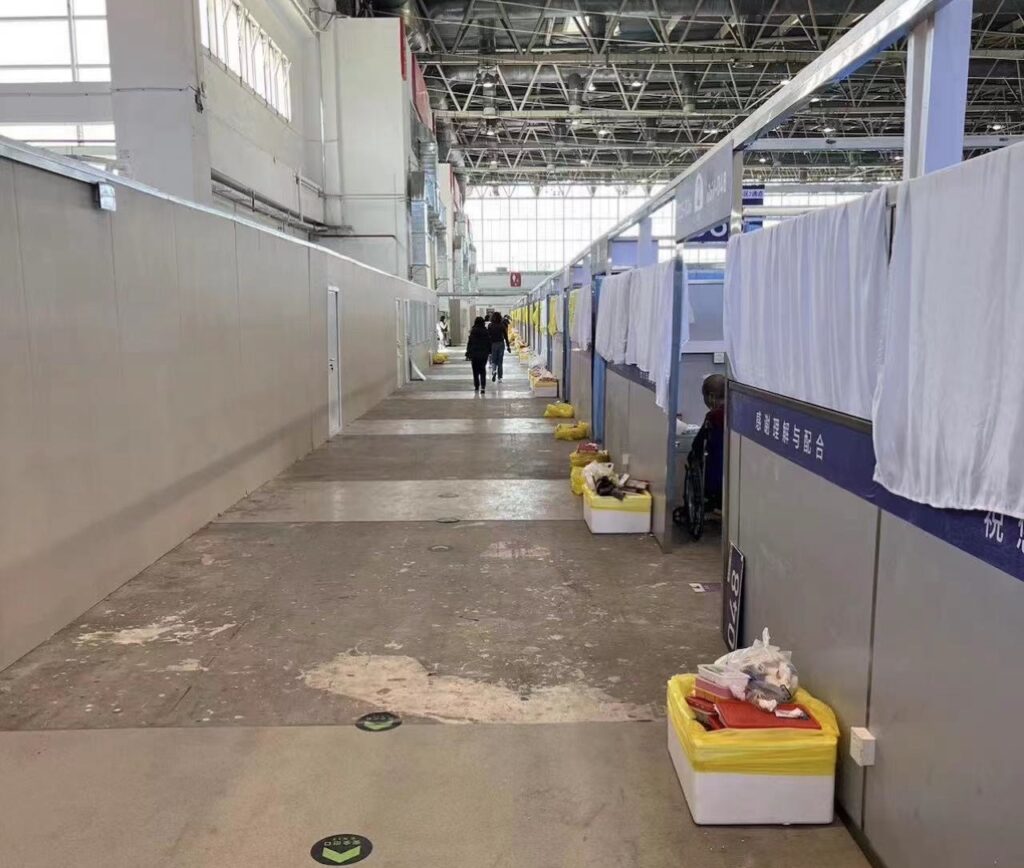
“We can’t go outside. We can’t leave our part of the hall either.”
So I had someone from the [Chinese] CDC call me on Monday, the day after I tested positive. And she had a list of everywhere I’d scanned for the past three days. So she was like, “OK, so at this time you went to this place. What were you doing there?” Some of them she didn’t have any information for. I guess the QR codes for those were little convenience stores, the ones that may not have been done correctly. But for the restaurants and bar I had been to, she had the name and was able to say, “OK, you’ve been here.”
I heard that in a lot of quarantine centers, the lights are on 24/7. Is that true of yours?
Yeah.
I imagine that’s annoying.
Yeah, at first I found that quite annoying. Sadly, you get used to it.
You’ve been in Beijing since the pandemic began. How are conditions different now, as opposed to last year?
Honestly, most of 2020 and 2021 — apart from the fact [we foreigners] couldn’t leave China, or we could but then we couldn’t come back — was basically normal. Sometimes if you traveled you might get tested, but they never really checked anyway. I maybe got tested less than 10 times in 2020 and 2021. Everything was open. It was super easy to travel around the country. There were occasional flare-ups, but it was always dealt with. Then from the beginning of this year, I’d say when Shanghai [lockdowns] happened, it’s just been harder and harder to travel, and more and more restrictions. A little bit earlier in the year I was still able to go somewhere and then come back to Beijing, and that doesn’t feel like that would be possible now.
With people shouting about the poor conditions inside your facility, I’m wondering if they’ve been talking about the wave of protests going on outside at all. Is that something that people have been discussing?
That’s not really something I’ve heard discussed here. I haven’t really brought it up because I didn’t really know anyone here, so I don’t really know what the vibe would be like. In general, people are acknowledging that “zero-COVID” is not really effective right now in China and things aren’t being run as well as they could be. I don’t know if everyone agrees that therefore we should open up, but I think there is a feeling of like, something’s not working.
Thanks for talking to the Pittsburgh Union Progress. I know it’s a weird time for you.
Oh, no worries. I did this for [a publication in Beijing], too, but they got scared to publish it. [Laughs.]
Editors’ note: Noelle Mateer lived for six years in China, where she worked as a journalist, including as an editor at Caixin Global.
Noelle is a business reporter at the Pittsburgh Post-Gazette, but she's currently on strike.

